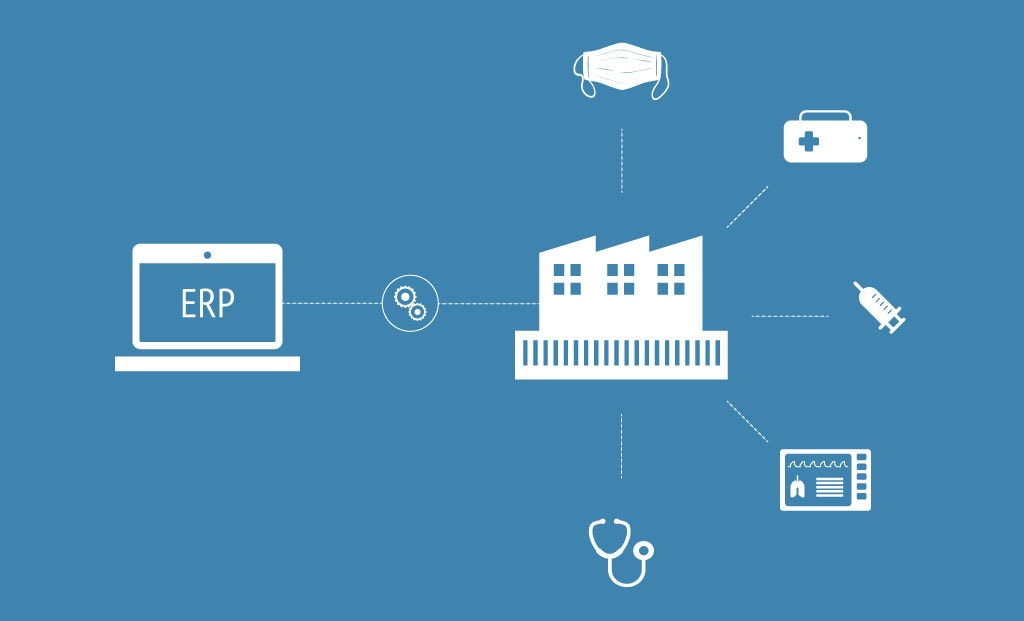The recent COVID-19 pandemic has put the entire medical fraternity under severe duress. Doctors, nurses and frontline healthcare workers are putting their lives at stake to save hundreds and thousands of lives affected by COVID-19. When all other manufacturing segments have come to a near-standstill, medical device manufacturers are working round the clock to meet severely high demands across U.S.A and globally. This, despite the fact that are facing severe shortage of labor. Many non-medical manufacturers from automotive, perfumery, liquor & beverages and fabrication segments have come forward to manufacture medical ventilators, hand-sanitizers, soaps and other life-saving equipment vital to fight Covid-19.
In such trying times, let us see how ERP software helps them to continue production and meet unprecedented high demand.
How are Medical Manufacturers continuing production?
Most medical equipment manufacturers are opting for lights-out manufacturing i.e. with bare minimum personnel, remotely-run machines and overall management with the help of an ERP software.
Employees with desk-jobs and administrative roles are made to work from home. These are from various departments such as Sales, Front-end and Back-end office, Accounting & Finance, Planning & Scheduling, and Human Resources etc. Employees from the shop floor, procurement, shipment & logistics, quality etc. are divided into various shifts instead of a full-blown shift. This ensures adequate social distancing between them which is necessary during this pandemic. Manufacturers ensure that only minimal staff is present at any given shift for critical workflows that require human intervention.
How is ERP Software helping them?
Modern ERP systems are acting as life-savers to medical manufacturers. Their advanced mobility and remote connectivity features allow personnel to work from home. Even the ones from the shop floor and other critical areas that otherwise, would have had to work on-premises.
With this,
- Shop floor managers can track machine status, get live reports on downtime, cycle time, maintenance issues, quality problems and performance of the machine.
- Procurement personnel get a real-time view of material consumption through work order tracking and initiate procurement from approved suppliers.
- Inventory personnel can look up stock availability, locations, work order/job requirements, and stock shortage. It also facilitates instant reflection of incoming and outgoing stock.
- Sales personnel can easily access incoming sales enquiries, RFQs, product enquiries and respond to them online.
- Work instructions specific to a part being manufactured, operating instructions, part drawings, quality inspection procedures, gage calibration procedures, etc. can be instantly shared to shop floor personnel.
- Quality checks can be conducted via phones and tablets. The results can be instantly recorded and fed into the ERP, which reduces errors, quickens the process and makes analysis very easy.
- Personnel can easily communicate, share data and documents with suppliers, vendors through EDI.
- HR department can keep a tab on the attendance of employees, total worklog to be handled and how the delegated work is being carried out.
- Accounting & finance personnel can keep a tab on project costs, overhead costs, invoice payments, credits etc.
- Shipping department have an extra role to play here, as they will have to ensure safety of their employees and also track shipments directed locally and globally. With an ERP, they can easily track shipments, invoice generation.
Special Focus on Quality & Compliance Management
Apart from facing extraordinary demand, medical manufacturers have to comply with stringent quality standards such as, TS13485 & ISO 9001 standards and meet FDA requirements. This means, they will have to keep a close eye on quality compliance. Long-time medical manufacturers have to continue focusing on their existing manufacturing procedures, and quality assurance programs. The same would have to be put in place by new manufacturers in their agreement with OEMs.
An ERP helps them to automate key quality parameters right from product planning till delivery. At every stage of manufacturing, personnel are alerted in case of quality deviations. They can maintain accurate product genealogy and traceability throughout the supply chain which is massively disrupted right now. Documentation is also a huge challenge, but ERP helps them maintain robust documentation and version controls, thereby complying with 21 CFR 11. For future audits, they can maintain an audit trial of manufacturing workflows along with timestamps and personnel details.
Conclusion
The COVID-19 pandemic has led the world to a near stand-still, putting the brakes on the economy. The entire medical fraternity including, medical manufacturers are the frontline warriors fighting for billions of lives. In such a scenario, ERP software providers are more than happy to support them in this noble cause.
We at OmegaCube want to let our manufacturing community know that OmegaCube ERP supports remote connectivity and advanced mobility features. Using this, manufacturers can carry out lights-out manufacturing and meet enhanced demands.
Get in touch with us to know how it works for your enterprise.






One Response
Just exploring your services